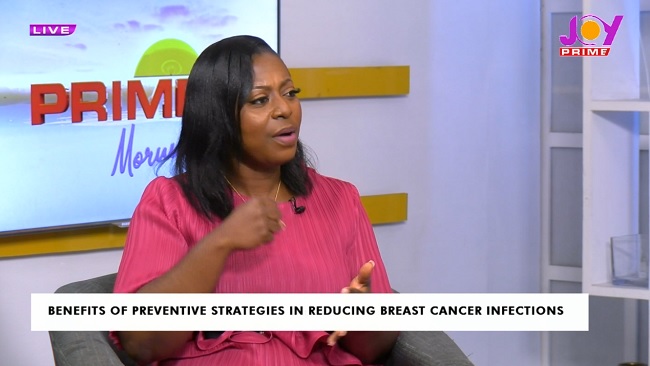Women’s health educator and Executive Director of Glitz Medical Centre, Stephana Sefa-Boateng, has cautioned ladies to stop relying on emergency contraceptive pills as their basic means to prevent pregnancy after sexual intercourse.
She said it is not a regular pattern of family planning and is one of the major predisposing factors to breast cancer.
According to her, most oestrogen-based emergency post-sexual intimacy pills contain oestrogen, which spikes breast cancer in females.
The public health practitioner said this while sharing insight about the benefits of preventive strategies in reducing breast cancer infections on Joy Prime’s Prime Morning on Tuesday.
"For people who take oestrogen-based contraceptives, my major concern is emergency contraception. The contraceptives you take for three days post-sexual intercourse to prevent pregnancy are not a regular pattern of family planning. That cannot be your basic means of family planning your entire life,” she told the host, Asieduwaa Akumia.
She has therefore recommended that those who need any form of contraception take a better or safer family planning option by seeking guidelines from experts rather than taking the emergency pills.
The majority of ladies depend on these contraceptives after every sexual encounter without bothering about the consequences. But the women’s health educator noted that it is ideally supposed to be taken once in a menstrual cycle.
Mrs. Sefa-Boateng also pointed out that ladies who have elongated exposure to female oestrogen are at risk of developing breast cancer based on the duration between their menstruation and menopausal ages.
“If you had your menses at 15 and you’re having your menopause at 55, that is a 40-year-old span of estrogen. So, that is the natural pathway. People who have early or very late menstruation are at big risk because oestrogen promotes breast cancer,” she said.
Nevertheless, the health practitioner pointed out that there is no concrete cause of breast cancer that is scientifically proven.
Often called the morning-after pill, emergency contraceptive pills (ECPs) are pills that can be taken up to 120 hours (5 days) after having unprotected sex. Some types of emergency contraception work best when taken within 72 hours (3 days) after intercourse.
These pills can cause some minor side effects for a few days, including nausea, vomiting, breast tenderness, headaches, and spotting. Most of these health conditions improve within 1 to 2 days. A girl's menstrual period is also likely to be temporarily irregular after she takes ECPs.
Meanwhile, people who experience the following symptoms after using emergency contraception are urged to call the doctor: have a change in the smell or colour of her vaginal discharge; have unexplained fever or chills; have belly or pelvic pain; have pain during sex; have heavy or long-lasting vaginal bleeding; or miss their period within 4 weeks of using emergency contraception.
Latest Stories
-
SIC Insurance PLC donates 50 laptops to KNUST
3 minutes -
I turned down specific brands because of my faith – Diana Hamilton
7 minutes -
‘Those who validate ghosts will pay’ – Finance Minister declares war on public sector payroll fraud
13 minutes -
GN Bank Chicago declared safe and sound by U.S. regulator
21 minutes -
Dando Manufacturing wins top honours for excellence in specialised drilling equipment and engineering solutions
32 minutes -
Private citizen donates patrol vehicle to Nkawie Police to boost crime prevention
41 minutes -
Gov’t has worked hard to stabilise exchange rate, it’s time to lower prices – Finance Minister tells businesses
44 minutes -
GJA orders re-run of Ashanti Regional Chairperson elections
49 minutes -
Gov’t to deploy AI at ports to curb revenue leakages – Finance Minister
51 minutes -
NPA scandal: Two more co-accused granted bail after meeting requirements
1 hour -
Gov’t launches forensic audit of stalled projects following loan discrepancies – Finance Minister
1 hour -
Minority Caucus demands repeal of L.I. 2462 as galamsey threat deepens
1 hour -
Full text: 2025 Mid-Year Budget Review presented by Finance Minister
1 hour -
State actors shielding galamsey networks – Minority Caucus alleges
1 hour -
Gov’t targets completion of 24 stalled projects by end of 2028 – Finance Minister
1 hour

